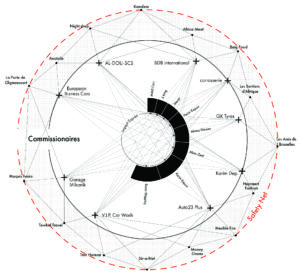It is Monday in the morning; the sun has already driven away the clouds and cold of the night. The streets are busy with trucks, carefully manoeuvring through the street. For someone who has never been in the area before, the large trucks transporting old cars might seem out of place. But on closer observation it becomes obvious that it is the start of just another week for the Heyvaerts neighbourhood. Car drivers wait patiently for the big trucks to pass, some having a little chat through their open window. People walking find their way through the cars crossing the street in serpentine without hesitation. The atmosphere in general is friendly and joyful with many people walking through the streets or hanging out in small groups in the sun. I can see nearly only men standing around outside, the women crossing my path appear to be busy with shopping bags or kids on their hands. Most of them seem to come from Africa. As it is also visible on the signs along the street: African food, restaurants, and barber shops. Although, I very obviously don’t fit in, I feel welcome and get caught by the joyful and busy atmosphere.
The vermilion coloured bricks of the facade at Rue de Liverpool 61 are in the spotlight of the morning sun. A play of light and shadow brings out the magnificent layering and emphasizes the simplicity of the facade. Openings, windowsills, and the pilasters mark their presence on the facade. A solid rhythm withstanding the test of time and outlasting every change. Creating the feeling of a different temporality in the centre of the ever changing daily life.
Taking pictures with a semi-professional camera and measuring parts of the building makes me stand out even more. Passers-by turn their heads curiously and I am asked several times about what I am doing. Contrarily to my assumption no one is offended or bothered by it. Moreover, people seem intrigued by my otherness. I get asked several times to take pictures of people on the street enjoying the attention through the lens of my camera.
**

While the world around us is constantly changing with technological interventions, growing urbanisation and new challenges, the way we build schools has barely changed.
It is time to adapt schools for future changes as well as preparing the kids for an unknown future.
Schools are the very first public building for children. It is the earliest built encounter with the public and premier step of integration into society. This makes schools not only important for the personal development of kids but for society itself. Kids are the Future. The way we teach them consequently impacts the future and our ability as a society to react to global and local challenges.
Instead of shielding children in the school building from the surrounding reality of the neighbourhood I advocate the value of opening education to reality with its good but also bad aspects. Kids have to be protected but not underestimated.
As infants we learn by observing our environment driven by a natural curiosity to understand and learn. This form of social learning is referred to as Observational Learning in psychology.1 Applying this concept in the education of kids will refine their ability to self-teach through investigation. Therefore, the vibrant and buzzing context of a city like Brussels offers many possibilities. In today’s world where knowledge is always available with modern technology skills like this gain in importance.
This concept goes along the African proverb “It takes a village to raise a child”. It exists in different variations depending on the local language and illustrates how the entire community of a village is responsible of a child’s upbringing.2 Transferring this idea from a village onto a city it raises the question of where to find communities in a city and how to define their boundaries. Besides, it shows that a classroom is not enough to teach children how the society works and educate them into responsible, confident, and kind human beings.
**


1 thought on “Lisa Eisen: Learning Without School – How to unlock the knowledge of the neighbourhood ?”
Comments are closed.